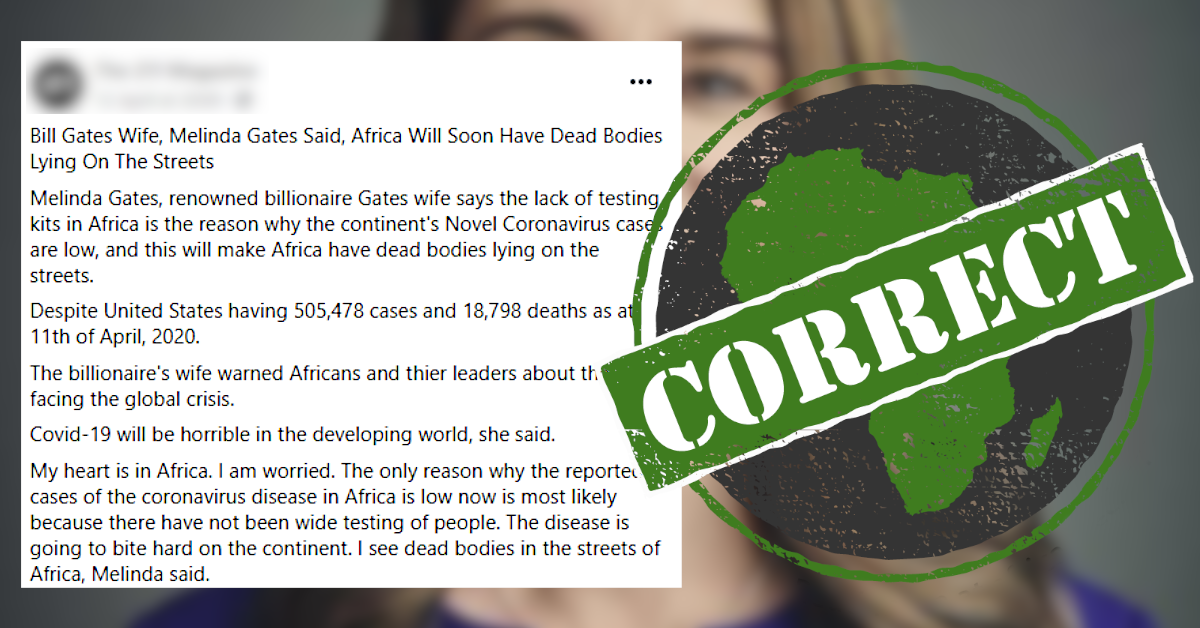| Are you looking for accurate information on the novel coronavirus pandemic? We've put all our fact-checks in one place. Read our Live Guide. |
“Bill Gates told us about Corona virus in 2015.” That’s the claim in a Facebook post published 15 March 2020 and shared and viewed all over the world.
The post includes a video of clips showing billionaire Microsoft founder and philanthropist Bill Gates speaking at a TED Talk. (Disclosure: The Bill and Melinda Gates Foundation is one of Africa Check’s funders, providing 18% of our income in 2018.)
Gates says: “If anything kills over 10 million people in the next few decades, it’s most likely to be a highly infectious virus, rather than a war.”
He then talks about the 1918 Spanish influenza pandemic, which caused an estimated 30 million to 50 million deaths worldwide, as an example of how devastating an untreated viral epidemic can be. He says countries are not prepared to deal with such an outbreak. The clip ends with Gates urging governments to prepare for viral outbreaks in the same way they prepare for war.
Coronaviruses are a large family of viruses that cause illnesses ranging from the common cold to more severe diseases. An outbreak of a new strain, given the name “2019-nCoV” and known as “novel coronavirus”, was identified in China in late December 2019. The virus causes the disease Covid-19.
As of 17 March 2020, there were nearly 200,000 confirmed cases of Covid-19 worldwide, and close to 8,000 deaths.
The post was flagged as possibly false by Facebook’s fact-checking system. Is the video genuine? We investigated.

TED Talk by Gates in 2015
The video on Facebook is a shortened version of a TED Talk Bill Gates gave in March 2015 in Vancouver, Canada. It’s titled: “The next outbreak? We’re not ready.”
The Facebook video does cut some parts of Gates’s eight-minute speech, but it doesn’t significantly change or misrepresent the content of the speech.
Gates also published a post – “We’re not ready for the next epidemic” – on his blog, GatesNotes, on 18 March 2015. The post includes his TED Talk. He wrote that the next global pandemic could be worse than the Ebola outbreak of 2014 to 2016 that killed about 11,000 people.
“The world is simply not prepared to deal with a disease – an especially virulent flu, for example – that infects large numbers of people very quickly,” Gates said.
Gates did say in his TED Talk that there was a possibility the next epidemic could be one that spreads through air or leaves people feeling not well enough to go out in public while infectious.
This is true for Covid-19, but these are characteristics of many viral diseases. Gates wasn’t warning the world of Covid-19, but of a disease like it. – Naledi Mashishi
Republish our content for free
For publishers: what to do if your post is rated false
A fact-checker has rated your Facebook or Instagram post as “false”, “altered”, “partly false” or “missing context”. This could have serious consequences. What do you do?
Click on our guide for the steps you should follow.
Publishers guideAfrica Check teams up with Facebook
Africa Check is a partner in Meta's third-party fact-checking programme to help stop the spread of false information on social media.
The content we rate as “false” will be downgraded on Facebook and Instagram. This means fewer people will see it.
You can also help identify false information on Facebook. This guide explains how.





Add new comment